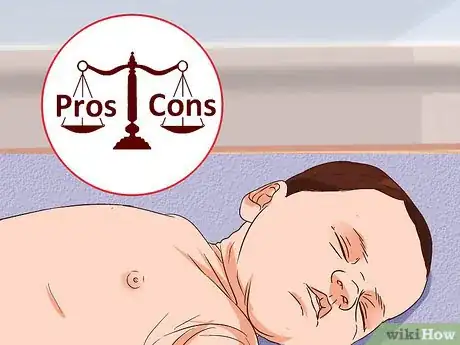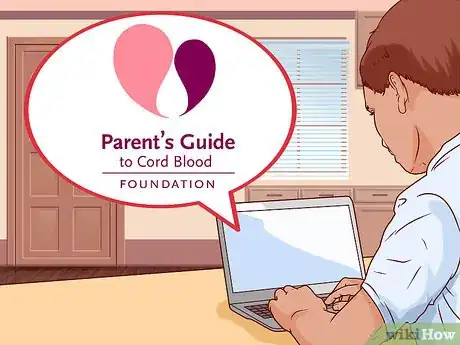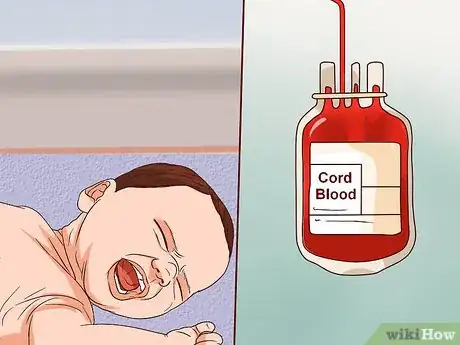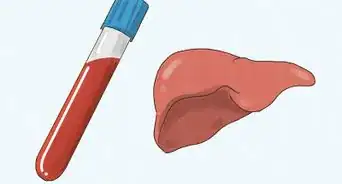This article was medically reviewed by Shari Forschen, NP, MA. Shari Forschen is a Registered Nurse at Sanford Health in North Dakota. Shari has worked in healthcare since 1996 and her expertise lies in acute care bedside nursing on a medical oncology floor. She received her degree from Medcenter one College of Nursing in 2003 and her Family Nurse Practitioner Masters from the University of North Dakota in 2014. Shari is a member of the American Nurses Association.
There are 9 references cited in this article, which can be found at the bottom of the page.
This article has been viewed 45,243 times.
You cannot store your own blood for private use either at home or at a facility, but you can store umbilical cord blood for family use at a private blood bank. The process is a costly one, but it does have its benefits. Spend some time learning about the benefits and drawbacks of private blood storage and then proceed to make a plan to collect and store your baby's umbilical cord blood.
Steps
Making A Decision
-
1Learn why people store blood. While some people store their own blood due to distrust of donated blood, most private blood storing involves storing blood from the umbilical cord of an infant. Patients with certain life-threatening conditions can be treated with blood transfusion using blood from the umbilical cord of a healthy baby. Many parents feel storing their own child's umbilical cord could be helpful in the event the child needs a blood transfusion later in life.
- Cord blood contains stem cells. Stem cells are able to form into many different types of cells which make them valuable in the treatment of certain disease like sickle cell disease, leukemia, lymphoma, immune deficiency syndromes, and metabolic diseases.
-
2Familiarize yourself with where blood can be stored. Storing umbilical cord blood is costly. You can donate the blood from the cord for free, but you must pay a private facility if you want the blood stored for your own child in the event of an emergency in the future.[1]
- Private blood banks exist throughout the country. You can ask your doctor about private blood storage services for the nearest facility in your area.
- Blood needs to be stored in specific conditions at specific temperatures in order to be viable for later medical use. Therefore, you cannot store umbilical cord blood at home. This practice is also illegal in many states.
Advertisement -
3Weigh the pros and cons of storing umbilical cord blood. While the practice has become more popular in recent years, umbilical blood storage is controversial. It is not recommended the American Society of Blood and Marrow Transplantation, the American College of Obstetricians and Gynecologists, and the American Academy of Pediatrics.[2] However, some parents and doctors still defend the practice.
- Using blood from your own child's umbilical cord does increase the likelihood of a blood transfusion being successful to a small degree. However, oftentimes children respond just as well, if not better, to donor blood.[3]
- The likelihood of the blood from your child's umbilical cord ever being used for your child is slim — less than 4/100th of 1 percent.[4] It is more than likely your child will need someone else's blood for a successful transfusion — the child's own cord may carry the same cells that caused the disease you are trying to treat.
- However, if you have another child with a preexisting condition that may require a blood transfusion down the line, most medical professional recommend storing a new baby's umbilical cord. Your child may benefit from a transfusion from her sibling's blood.[5]
-
4Consider cost. Private blood storage is expensive. A first year processing fee of $1,400 to $2,300 is common. After that, there are annual fees of $115 to $150. Consider whether private blood storage is financially viable for you before making a decision.[6]
-
5Learn about health conditions that might make umbilical cord storage important for your child. Certain health conditions increase the chance of your child or another family member needing a blood transfusion. This might even effect cost of storage.
- Keep in mind some private banks offer discounts if you have extenuating circumstances. If you have a family history of leukemia or lymphomas, sickle cell anemia, thalassemia, immune deficiency diseases, or metabolic storage disorders this will increase the likelihood a family member will need a blood donation. A bank may be willing to offer you a discount rate in this case.[7]
- If you have an existing child who already has one of the above disorders, umbilical cord donation may be a good idea. This child is at an increased risk of needing a blood donation down the road. Once again, a private bank may offer you a discount in this case.[8]
Setting Up a Private Blood Bank
-
1Find a good family cord blood bank. There are family cord blood banks in countries throughout the world. You can ask your doctor or hospital to direct you to a private bank with a good reputation, or you can look on a directory of private blood banks and do your own research on those you find.
- The Parent's Guide to Cord Blood Foundation has a worldwide directory of family cord blood banks, which you can browse for free.[9]
- Note that cost is not necessarily an indication of quality. Some less expensive blood banks might be cutting corners in potentially unsafe manners, but others might have lower costs simply because they spend less on marketing. Reputation is usually a better indication than anything else. You should also check on the qualifications and experience of those running the blood bank, as well as the company's viability, stability, and storage technology.[10]
- Shop around. If one blood bank can't offer you a discount, call another. It may take awhile to find the best rates for your financial situation.[11]
-
2Include the decision in your birth plan. Once you find a private blood bank you want to work with, you should contact them and make arrangements. You should also make sure that your doctor and hospital are aware of these arrangements at least one month before your baby is born, if not sooner.
- The company you've chosen to bank with should send you a collection kit. You must give this kit to the hospital or birthing center at the time of delivery. Even though the hospital will not receive the kit until delivery, you should still make them aware of your intentions beforehand.[12]
- Make sure that cord blood is collected after delivery. Doctors and nurses should collect the blood from your baby's umbilical cord within a few minutes after the birth of your child.[13]
-
3Take the blood out of storage if necessary. Each private blood bank has its own procedures, but when your family needs the cord blood stored at the bank, you should be able to notify the bank and have the blood delivered to your hospital for a transfusion. You may need medical authorization from a doctor to show the blood is presently needed. The cord blood will be tested to see whether or not it's a match for the patient.
References
- ↑ https://www.whattoexpect.com/pregnancy/cord-blood/what-is-cord-blood-banking/
- ↑ https://www.aafp.org/afp/2011/0915/p661.html
- ↑ https://www.nature.com/articles/s41408-019-0204-x
- ↑ https://parentsguidecordblood.org/en/faqs/what-are-odds-we-will-need-our-cord-blood
- ↑ https://www.viacord.com/cord-banking/sibling-connection/
- ↑ https://www.cigna.com/individuals-families/health-wellness/hw/medical-topics/pregnancy-zx1634
- ↑ http://www.babycenter.com/0_storing-cord-blood-in-a-private-bank_1369773.bc
- ↑ http://www.babycenter.com/0_storing-cord-blood-in-a-private-bank_1369773.bc
- ↑ https://parentsguidecordblood.org/en
- ↑ http://www.babycenter.com/0_storing-cord-blood-in-a-private-bank_1369773.bc
- ↑ http://www.babycenter.com/0_storing-cord-blood-in-a-private-bank_1369773.bc
- ↑ https://parentsguidecordblood.org/en/news/cord-blood-collection-kits
- ↑ http://www.babycenter.com/0_storing-cord-blood-in-a-private-bank_1369773.bc
















-Step-14-Version-2.webp)




















































Medical Disclaimer
The content of this article is not intended to be a substitute for professional medical advice, examination, diagnosis, or treatment. You should always contact your doctor or other qualified healthcare professional before starting, changing, or stopping any kind of health treatment.
Read More...